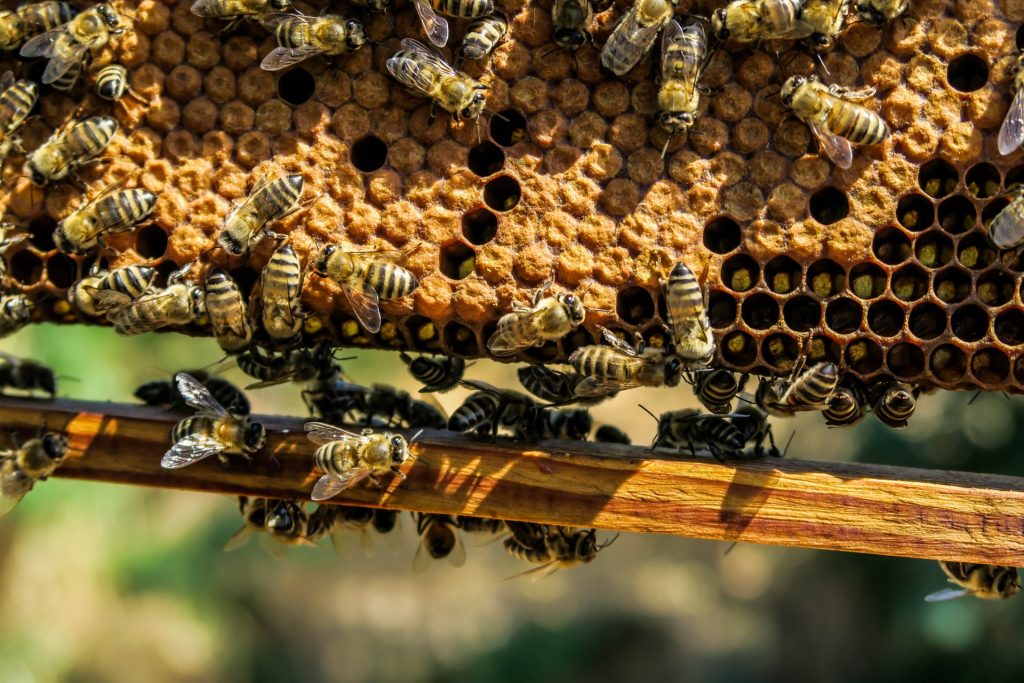Weighing in on the big issues that ooze with controversy; is honey vegan or not?
The word ‘vegan’ was first spread in 1944 by Donald Watson who said, ‘Veganism is a way of living which excludes all forms of exploitation of, and cruelty to, the animal kingdom, and includes a reverence for life. It applies to the practice of living on the products of the plant kingdom to the exclusion of flesh, fish, fowl, eggs, honey, animal milk and its derivatives, and encourages the use of alternatives for all commodities derived wholly or in part from animals.’
By this initial definition, honey isn’t vegan.

However, by modern definition, to follow a vegan lifestyle means; ‘to refrain from eating any animal products (or anything derived from animal products) or using animal products such as leather, silk, or wool and consciously aim to reduce the amount of suffering and cruelty to animals.
BUT if abstaining from consuming or using products from animals is what the vegan lifestyle revolves around, does refraining from honey, bee pollen, beeswax, propolis, bee venom and royal jelly (all products obtained from bees) count? Noting that bees are a type of flying insect.
This is tough one and it will always be a contentious issue within veganism; as with everything there are many varying opinions and arguments for either side.
Honey and bee pollen is a bee’s primary nutrition source and while they do make excess amounts, they store it for the winter months as a safety measure incase they’re unable to produce enough feed for the colony.
Vegans that use bee products say that because honey is made in excess, that harvesting it doesn’t (always) harm them, and bees aren’t technically an animal; it’s therefore acceptable to follow a vegan lifestyle and still eat honey. Many also say that if you still continue to kill flies, mosquitoes, etc which are insects, then it is contradictory to regard bees with any more importance.
On the other hand, vegans who refrain from the use of bee products often believe that the honey industry exploits bees, and that many practices involved in honey production are unethical and unnecessary.

Often, particularly in commercial honey production, the queen bee can be artificially inseminated and have her wings removed to prevent her from leaving the hive and colonising a different one. The bee-keepers will also take all of the honey, rather than just the excess and replace it with a cheap synthetic alternative (sugar syrup), enabling them to sell the bee’s honey for a profit.
Furthermore, anything involving creatures which humans cannot communicate with is always going to come with issues. Bees, like most other species, don’t listen to humans and we cannot reason with them or work alongside them; this puts the honey production saga into a dictatorial position with humans being the controlling force over the bees and interfering with their natural processes. Subsequently this makes honey production an exploitation of non-human creatures.
The risk of bee casualty and injury is very high, from human interference and from the bees natural defence instincts which make them lose their stingers.

When there are so many alternatives to honey and honey-products such a maple/rice/glucose/agave syrup, molasses, soy or candella wax, sweeteners such as golden or brown sugar, there really isn’t the need to support the exploitation of bees and the honey industry as they can so easily be replaced by a plant-based, vegan alternative just like using oat mylk instead of dairy milk.
From honey to pony-poo garden fertilizer – we’re lucky to live in a world with an abundance of alternative options. It’s simply a case of looking.
For more information about bees, check out our previous article on why they are so important to humans and what we can do to help prevent their extinction.


